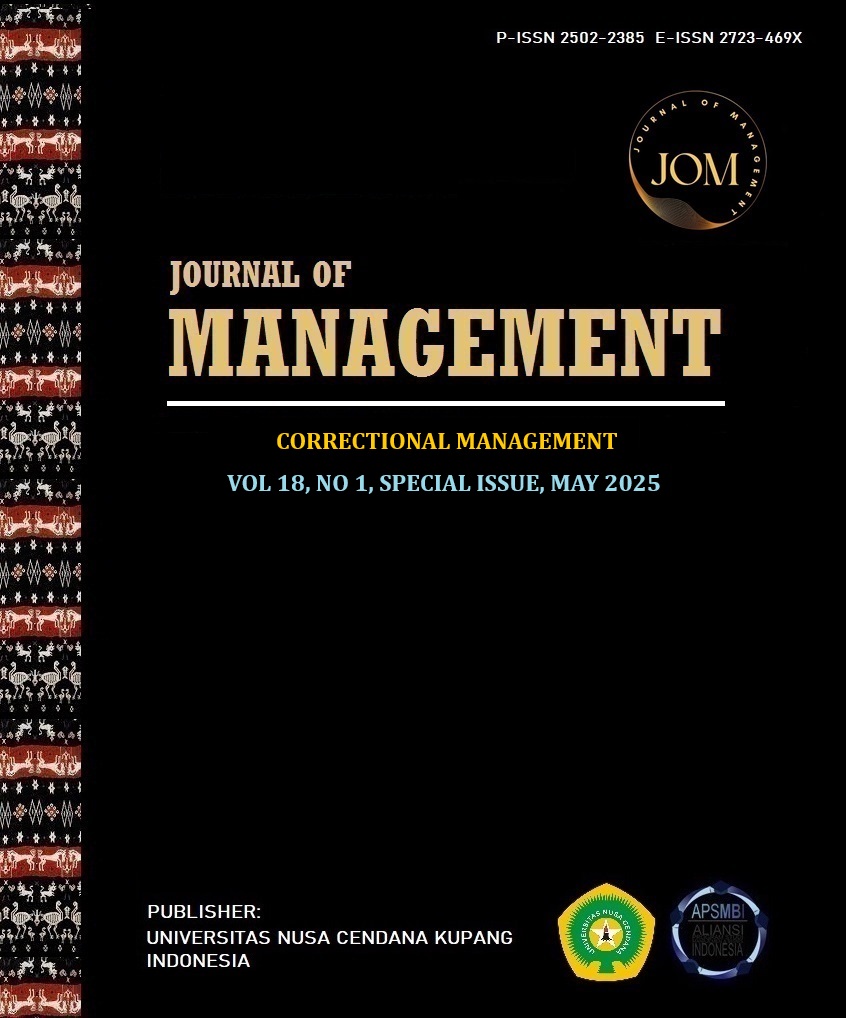STRATEGY OF ILLITERACY ELIMINATION PROGRAM IN IMPROVING LITERACY SKILLS OF INMATES AT CLASS IIB PRABUMULIH PRISON
Abstract
This study aims to identify strategies for the illiteracy eradication program to improve the literacy skills of inmates at the Class IIB Prabumulih Detention Center. The background of this research is the high illiteracy rate in Indonesia, particularly among inmates, which poses challenges in their rehabilitation and social reintegration efforts. The research method used is qualitative with a descriptive approach, involving direct observation, interviews, and documentation. The results show that the strategies implemented in this program include mapping the literacy needs of inmates, designing a curriculum based on their needs, utilizing interactive learning methods, and receiving support from competent educators. The challenges faced include low motivation among inmates and limited resources and facilities. However, the program has proven effective in enhancing the reading, writing, and arithmetic skills of the inmates. In conclusion, the illiteracy eradication program at Class IIB Prabumulih Detention Center has a positive contribution to inmate rehabilitation efforts, but improvements in resources and external collaboration are needed to overcome existing challenges.
Keywords: Illiteracy Eradication; Literacy; Inmates; Rehabilitation; Class IIB Prabumulih Detention Center
Downloads
References
Agustin, T. (2021). Pemenuhan Hak Ta-hanan dalam Pelayanan Pendidikan dan Pengajaran Melalui Program Pemberantasan Buta Aksara di Ru-tan Kelas IIB Pemalang. Jurnal In-donesia Sosial Teknologi, Vol 2, No 3.
Farabi, A. (n.d.). Pendidikan Nonformal dan Pengembangan Sumber Daya Manusia. Jakarta: PT Citra Pendidi-kan.
Hariadi, A., Wulan, A. S., & Al-pian, Y. (2019). Pemberantasan Bu-ta Aksara di Indonesia: Studi Kasus Program Pendidikan di Daerah Tertinggal. Surabaya: Universitas Negeri Surabaya.
Imanto, R., & Sutrisno, H. (2020). Peran Pendidikan dalam Pembangunan Sumber Daya Manusia. Jakarta: Kencana Prenada Media.
Jessica, S., Purhadi, & Andari, F. (2017). Buta Aksara dan Tantangan Pen-didikan di Indonesia. Yogyakarta: Universitas Gadjah Mada Press.
Marwoto, S. (2016). Keaksaraan Fungsional dan Pemberantasan Bu-ta Aksara di Indonesia. Jakarta: Ke-menterian Pendidikan dan Ke-budayaan.
Mulgan, G. (2009). Public Strategy and Its Applications in Education Policy. New York: Oxford University Press.
Purhadi, & Andari, F. (2017). Analisis Data Sensus Pendidikan di Indone-sia. Jakarta: Badan Pusat Statistik.
Quraisy, F. (2016). Strategi Pemberanta-san Buta Aksara di Daerah Pedesaan: Sebuah Studi Empiris. Jurnal Pendidikan Nonformal, Vol 12, No 2.
Rahayu, S. H. (2018). Pengetesan Ke-mampuan Membaca Secara Komu-nikatif. Bandung: Alfabeta.
Sari, A. (2018). Literasi sebagai Modal Dasar dalam Menghadapi Era Globalisasi. Jakarta: Gramedia Pustaka Utama.
Sugiyono. (2023). Metode Penelitian Pendidikan: Pendekatan Kuantitatif, Kualitatif, dan R&D. Bandung: Alfabeta.
Suratno, S., & Fitria, N. (2022). Tan-tangan Global dalam Pemberanta-san Buta Aksara di Indonesia. Pa-lembang: Universitas Sriwijaya Press.
Wulandari, F., & Safar, M. (2022). Pem-berantasan Buta Aksara melalui Ap-likasi Magguru Mabbaca. Seminar Nasional Paedagoria, Vol 2.

 Aldi Satrio Hartawan(1*)
Aldi Satrio Hartawan(1*)



